by Dady Chery
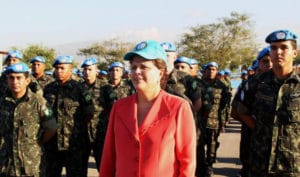
For the 10th year since the forcible removal of elected Haitian President Jean-Bertrand Aristide from Haiti, the United Nations has renewed the mandate of an occupying “peacekeeping force” in the country. The unanimous vote about Haiti happened in an Oct. 14, 2014, meeting of the Security Council that took less than 25 minutes.
The U.N.’s occupation of Haiti with its Stabilization Mission (Mission des Nations Unies pour la Stabilisation en Haïti, MINUSTAH) is not merely due to the high-handed decisions of its Security Council. At a meeting of the General Assembly on May 7, 2014, for example, when the Secretary General proposed a reduction of MINUSTAH’s yearly budget from $575.89 to $511.31 million, Brazil proposed that the U.N. troops should be replaced with U.N. law enforcement for the same budget.
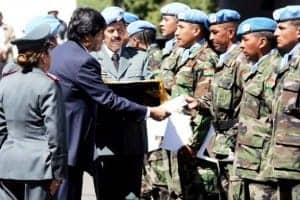
Guatemala argued that the higher sum would be needed to support MINUSTAH’s “essential role in helping Haiti hold legislative and local elections expected later this year,” and Haiti’s representatives said that MINUSTAH could not withstand this 11.2 percent budget reduction because of its need for “a well-balanced budget to fight cholera, among other challenges.”
The disparity between Haitian public opinion, which has for years demanded an immediate and total removal of MINUSTAH, and the statements of its politicians is to be expected. Haiti’s representatives were, after all, installed in U.N.-sponsored elections that excluded the Fanmi Lavalas party and 80 percent of the electorate.
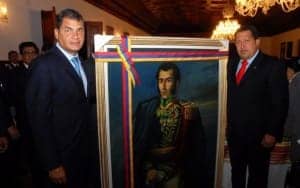
For their repression of Haitians, Brazil and Guatemala expect not only prestige on the world scene, but also a significant chunk of MINUSTAH’s massive yearly budget. Other Latin-American occupiers of Haiti with similar aspirations include Argentina, Bolivia, Chile, Colombia, Ecuador, El Salvador, Honduras, Paraguay, Peru and Uruguay.
The behavior of these countries’ heads of state is in accord with the expectations of Niccolo Machiavelli, who wrote in “The Prince” that one should expect the worst treatment from those whom one has helped, because no one wants to be reminded of a time when they needed to be helped.
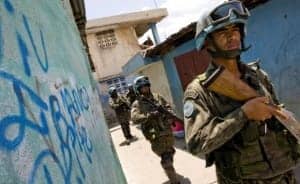
Indeed, without Haiti’s help, there would not have been any independent country in Latin America. On January 1, 1816, when Simon Bolivar arrived in Haiti, downtrodden and desperate for help to fight the Spanish, the only two republics in the Western Hemisphere were the United States, where slave ownership was in force, and Haiti, which had fought for and earned its independence from France, Spain, and the United Kingdom in what is still the only successful slave rebellion ever in the world.
Bolivar had been beaten by a massive Spanish expedition in his attempt to free the northern regions of South America. He had been refused help by the British in Jamaica.
Before Bolivar, only two years after Haitian Independence, the Venezuelan revolutionary Francisco Miranda had sought and received help from Haitian founding father Jean-Jacques Dessalines; Miranda had left in February 1806 carrying, among other things, a Venezuelan flag that had been designed in Jacmel, Haiti. Bolivar came to Haiti to seek an audience with President Alexandre Petion. Petion agreed to see him the next day.
Without Haiti’s help, there would not have been any independent country in Latin America. On January 1, 1816, when Simon Bolivar arrived in Haiti, downtrodden and desperate for help to fight the Spanish, the only two republics in the Western Hemisphere were the United States, where slave ownership was in force, and Haiti, which had fought for and earned its independence from France, Spain, and the United Kingdom in what is still the only successful slave rebellion ever in the world.
When the two men met, Petion was 46 years old and had already twice been reelected president of a republic of former slaves. By contrast, Bolivar was 33 and had once been a rich plantation and slave owner. Petion asked Bolivar: “How can you found a republic where slavery exists?”
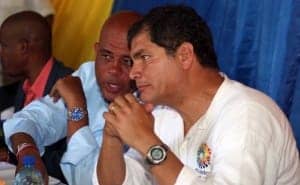
He agreed to help Bolivar on condition that all slaves would be freed in the liberated areas. The pact between these two major historical figures, almost half a century before Abraham Lincoln’s Emancipation Proclamation, was necessarily secret because Haiti’s assistance would have been considered an act of war by the United States and Spain.
Petion gave Bolivar and his men food and shelter for three months in Haiti. He also built cohesion among Bolivar’s officers and prevented at least one rebellion that would have caused the loss of a ship. Among other things, he forbade the ship’s use for any attack not approved by Bolivar, and he generally warned the men that those who did not follow Bolivar’s leadership would be forced to stay in Haiti and not join the expedition.

Bolivar left Haiti on March 31, 1816, with plans to take Venezuela. He had with him about 250 men, most of them officers, and he was outfitted by Petion with a small fleet, a printing press for propaganda, and weapons for 6,000 men, including 4,000 muskets and 15,000 pounds of gunpowder, plus money and food. After a disastrous six-month campaign, some of which was blamed on Bolivar’s tactical mistakes due to a reckless appetite for women even in the midst of his battles, he returned to Port-au-Prince, Haiti.
Petion, who had just been elected president of Haiti for life, helped Bolivar once again to recover and organize his most loyal officers. This time he supplied Bolivar not only with materials but also with Haitian soldiers. According to Bolivar’s later writings, “This group of Haitians that faced down 10,000 European tyrants numbered 300 men.”
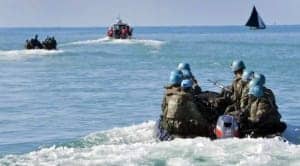
This second expedition left for Venezuela on Dec. 21, 1816. Bolivar’s campaign would be tortuous, but ultimately he would win independence for an area that includes modern-day northwest Brazil, Guyana, Venezuela, Ecuador, Colombia, Panama, northern Peru, Costa Rica, Nicaragua and Bolivia. As promised to Petion, Simon Bolivar declared slavery to be abolished in his territories.
This is where the narrative about Petion and Bolivar usually ends, and it is a great story if one believes in fairy tales. Latin America does not like to be reminded that its great liberator, Simon Bolivar, never formally recognized the Republic of Haiti and never sent any diplomatic representative of his new government to our island republic.
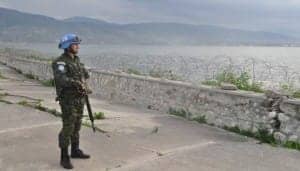
In 1826, for the first meeting of the independent states of the Americas, i.e. the Congress of the American States in Panama, Bolivar invited United States President John Quincy Adams, a proponent of the Monroe Doctrine and supporter of the slave trade, but he excluded Haiti.
Ironically, current-day occupiers of Haiti from the regions that had been freed by Bolivar like to recall the “glorious relationship of Bolivar and Petion,” as if this could hypnotize Haitians and ever be a distraction as these occupiers continue a tradition of betrayal.

Venezuela does not participate in MINUSTAH, but it is helping the current Haitian regime to build villas on Ile a Vache, an offshore island that the regime’s ministry of tourism is trying to expropriate forcibly from its residents. Leaders of countries like Bolivia, Ecuador and Uruguay present themselves as being independent and anti-imperialistic, yet they do as the U.S. says, as per tradition. All supply MINUSTAH with “peacekeeping troops.”
Like any other occupation force, the U.N. troops harass, shoot, prostitute, infect and rape as a matter of routine. Moreover, they do so under cover of U.N. immunity. For example, in 2011, five Uruguayan troops raped a Haitian boy, Johnny Jean, and, with their government’s complicity, they got away with their crime despite having videotaped it.
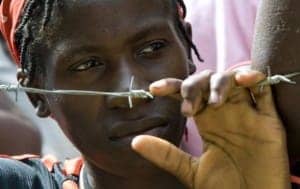
Likewise, Argentinian, Brazilian and Chilean (ABC) troops have faced no criminal charge for their massacres of thousands of Aristide partisans, some of which is immortalized on videotape. Ecuador has sung praises to Petion even as it embraced Michel Martelly and offered to train his army and paramilitary police.
Of all the group, Brazil has been the most shameful in testing new military hardware in Haiti and making a lucrative business of training “peacekeepers” for deployment in Haiti, precisely because Haitians mistakenly consider themselves to be at peace. In addition, Brazil has secured Haitian reconstruction contracts for its more corrupt industries and trafficked Haitian nationals to work with its worst employers in an arrangement that amounts to slavery.
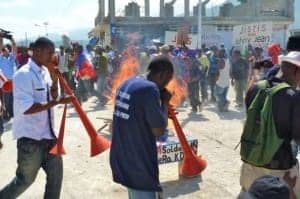
As Latin America contributes to U.N. occupation forces in Haiti and elsewhere, it is amassing a repressive army away from the prying eyes of its citizens. The size of this army is unprecedented; it can be activated at a moment’s notice against its home population, and it is loyal mainly to multinational corporations.
As this army continues to grow, the so-called Latin-American democracies are becoming nothing more than banana republics with figurehead elected leaders and a powerful military that calls all the shots. We Haitians have no choice but to continue our revolution and follow Dessalines’ admonition: “Vow before me to live free and independent and to prefer death to anything that will try to place you back in chains. Swear, finally, to pursue forever the traitors and enemies of your independence.”
By denying Haiti, pretending that Haitian independence never happened and trying to destroy Haiti’s slave revolution, Latin America cannot become more powerful on the world scene. It can only lose its way and Haiti’s great gift of independence.
Related articles
April 21, 2014 What Kind of Tourism Is Sustainable for Haiti’s Ile a Vache? Interview With Melinda Wilson
April 8, 2014 Human Rights Organizations: Widespread Abuse and Police Brutality in Haiti’s Ile a Vache
Sept. 14, 2013 United Nations: The Perversion of a Good Intention
Nov. 29, 2012 Haiti’s Gold Rush: An Ecological Crime in the Making
Nov. 24, 2012 USAID: The Soft Arm of Imperialism
Dady Chery grew up at the heart of an extended working-class family in Port-au-Prince, Haiti. She emigrated to New York when she was 14 and since then has traveled throughout the world, living in Europe and several North American cities. She writes in English, French and her native Créole and holds a doctorate. She can be reached at dc@dadychery.org. This story first appeared on News Junkie Post and is also available in Portuguese.





